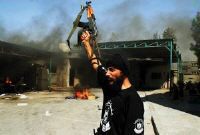 |
| Photo by Hatem Omar/MaanImages / Associated Press • A Hamas militant celebrates next to a burning building at the headquarters of the Palestinian security forces loyal to President Mahmoud Abbas after capturing it in fighting in Rafah, southern Gaza Strip on. Hamas overran two of the rival Fatah movement’s most important security installations in the Gaza Strip on Thursday. |
Jerusalem – Hamas forces continued to consolidate their hold on the Gaza Strip on Thursday, seizing increasing numbers of positions that formerly were manned by Palestinian security services loyal to Fatah, chaired by Mahmoud Abbas, also know as Abu Mazen.
Fatah Preventive Security Service and National Security Service strongholds fell as Hamas troops pressed ahead under the cover of mortar fire and rocket-propelled grenade attacks, detonating explosives in strategically positioned tunnels throughout the Gaza Strip. Palestinian National Security Service troops who were stationed along the Egyptian border reportedly abandoned their posts under attack, with some of them fleeing the Gaza Strip altogether into Egypt. The last Fatah stronghold to fall in Gaza was the presidential compound, which was shelled repeatedly by Hamas forces.
Israel government radio reported on Thursday that Presidential Guardsmen stationed in Gaza had sought presidential consent to stage a counteroffensive against Hamas, but Mahmoud Abbas has withheld granting any such permission.
A former head of Israeli intelligence in Judea, Samaria and Gaza commented: “Abu Mazen’s Palestinian leadership no longer has anything to say. Abu Mazen, detached from reality, lives in the past, ignores the present and has not planned for the future. He is still toying with the hope that he will be able to heal the rifts, and therefore has not instructed his forces in Gaza to fight back.”
Hamas Seizes U.S.-Financed Weapons, Equipment
The Middle East Newsline has confirmed that the Hamas captured thousands of assault rifles and scores of combat vehicles financed by the United States and supplied by Egypt and Jordan to the Palestinian Authority. That will call into question any future arms shipments to the PA.
The Islamic movement acquired the weapons, ammunition and vehicles during Hamas’ capture of security installations in the Gaza Strip aligned with PA Chairman Mahmoud Abbas. For the most part, Fatah-aligned PA officers fled the Hamas assaults.
“I would say that they have most of the weapons and armored vehicles sent by Egypt and Jordan over the last year,” a PA security officer said.
The officer said Hamas seized thousands of U.S.-origin M-16 and Soviet-origin AK-47 Kalashnikov assault rifles as well as military radios.
He said other booty captured by Hamas included trucks, mortars and hand grenades.
On Wednesday, Hamas’ Web site posted photographs of the weapons and vehicles seized from PA installations. Some of the vehicles were covered with Hamas’ insignia.
The Bush administration is expressing shock at the Hamas capture of the Gaza Strip.
U.S. officials admitted that the defeat of forces aligned with PA Chairman Mahmoud Abbas took the administration by surprise. They said that neither the administration nor the U.S. intelligence community expected Fatah to collapse.
“There is shock and awe,” an official said. “It’s a major blow to the U.S. administration’s policy.”
On Wednesday, the U.S. administration, for the first time in nearly two years, sought to distinguish between Hamas’ political leadership and the military wing. The State Department said Hamas politicians were not involved in the offensive in the Gaza Strip.
“It is this so-called military wing of Hamas that launched these attacks,” State Department spokesman Sean McCormack said. ” [It has] started these rounds of violence that has swept up innocent civilians in firefights and gunfights and the shelling and the mortaring just as Egyptian envoys were working to try to bring together elements of Hamas and Fatah – political elements of Hamas and Fatah to come to some sort of political accommodation so they can lower the violence.”
However, such a distinction between the political and military wings of Hamas and Fatah simply does not exist.
Abbas Dissolves Palestinian Gov’t
A beleaguered Palestinian President Mahmoud Abbas declared a state of emergency and disbanded the Hamas-led unity government after the Islamic militant group vanquished its Fatah rivals and effectively took control of the Gaza Strip on Thursday.
Fearful that Hamas’ momentum could spread to the West Bank, Fatah went on the offensive there, rounding up three dozen Hamas fighters. Angry Fatah militants threw office furniture out a third-story window of the Palestinian parliament building in the West Bank city of Ramallah, then set fire to the office of three Hamas lawmakers.
It was a day of major victories for Hamas and its backers in Iran and Syria – and of devastating setbacks for the Western-backed Fatah. In one particularly humiliating scene, masked Hamas fighters marched agents of the once-feared Preventive Security Service out of their headquarters, arms raised in the air, stripped to the waist and ducking at the sound of a gunshot.
The violence has killed at least 90 people in the past five days, including 32 on Thursday alone. Witnesses, Fatah officials and a doctor reported executions by Hamas militants of defeated Fatah fighters Thursday; Fatah said seven of its men were shot in the head gangland-style. Hamas denied any such killings.
Abbas, of Fatah, fired the Hamas prime minister and said he would install a new government, replacing the Hamas-Fatah coalition formed just three months ago. Abbas’ decrees won’t reverse the Hamas takeover of Gaza. Instead, his moves will enable Fatah to consolidate its control over the West Bank, likely paving the way for two separate Palestinian governments.
Some 2 million Palestinians live in the West Bank, while 1.4 million reside in Gaza.
David Bedein can be reached at Media@actcom.co.il. His Web site is www.IsraelBehindTheNews.com
The Associated Press contributed to this report.
©The Bulletin 2007







